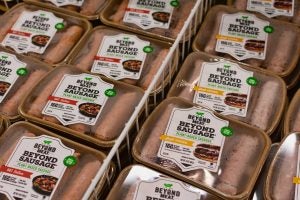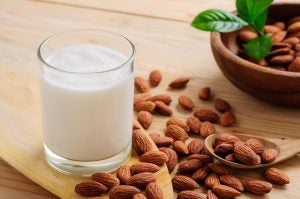A conversation overheard inside a Mississippi correctional facility:
Prisoner 1: “Whatcha in for?”
Prisoner 2: “Some guy looked at me funny so I broke a beer bottle and shoved it into his stupid face. What about you?”
Prisoner 1: “I referred to a plant-based meat patty as a burger. “
Thanks to the recently passed law in the USA’s most last place state, referring to a food item that is not meat as a meatoid form can land you in prison, ironically a place where mystery meat is common fare. That’s hard time for a vegetarian, a painful price to pay for making reference to extruded soy solids as a hotdog. Later, the promise of getting a salad tossed didn’t match expectations either.
The law follows on the heels of similar legislation in Missouri, fostered by the meat industry’s powerful lobby groups. With all the buzz about Impossible and Beyond Burgers, folks in the meat sector are taking a little umbrage at Big Macsimilies, casting them as inferior plant-flesh knockoffs of meat-based food. Plant-based “milk” beverages are also under legislative scrutiny, as almonds and soybeans don’t lactate. Yet.
Stop being weenies
Meat and dairy industries, I love ya, so knock it off. I’m like the friend who cares enough to tell you, “You’re not really going to wear that out in public, are you?” Yes, that’s me, and what you are doing is quite unbecoming for an industry that works hard, makes an outstanding product, and does it with an ever-improving interest in animal care and sustainability.
Promoting laws to protect a market share makes you look weak. It is like you are running the meat marathon and you are looking nervously over your mighty shoulder at the scrawny chain-smoking vegan in a latex gimp suit and high heels running 25 miles behind you, worrying that he’s gaining ground. Maybe he looks different, sorta trendy, maybe even attractive to some, but you don’t have much to worry about in the race to the North American plate.

Meat your maker
First of all, they aren’t making plant-goo copies of ribeyes and filet mignons. They focus on hotdogs and burgers, the meat industry’s most low-end composite concoctions. But these are iconic cornerstones of the U.S. diet, like apple pie made out of muscle. What meat-alternative marketers have demonstrated is that it is possible to mold strategically seasoned plant guts into a iconic meat forms and call it food. To someone who does not consume meat, it works pretty well. Ask me how I know. In 1994 I was fat and broke, so I ate only vegetables. Pretty soon I lost 70 pounds and the desire for meat, and actually enjoyed fake hot dogs and burgers. The Greek Gardenburger was really great. Sixteen years later I feel off that wagon into a pulled pork sandwich and haven’t looked back since.
And why start calling food products what they actually are anyway? Peanut butter contains no butter and sometimes no peanuts. Should a chocolate Easter egg now don the moniker of resurrection day cacao orb? And nobody in the meat industry got prickly when McDonalds sold the McRib, pressed pig squeezins formed into fake ribs, only without the actual bones. If almond juice isn’t milk, then formed pork ribs aren’t ribs. It is a BBQ-sauce coated slippery slope.

Why it matters
The optics of protecting market share by being so defensive are not helping meat’s image. If the meat and dairy industries want to sway the consumer away from phogna bologna, they need to understand some simple math and complex psychology. Instead of making meat-like stuff a jailable offense, maybe adopt these simple strategies and embrace these realities:
- Remind the consumer that imitation is the sincerest form of flattery. Teach consumers that the reason that faux beef and cheese exist is because cheeseburgers are good, dammit. The reason some companies craft sausage out of breadcrumbs, beans, and textured proteins is because sausage rocks. If it was not good, they would not copy it, so note their efforts as a supreme endorsement of a job well done.
- Speak to the nutritional composition of animal-based protein. Meat products provide important nutritional elements not available without a carefully planned diet and supplementation. Early childhood cognitive development benefits from meat proteins, and it provides vitamin B12 and essential amino acids that are difficult to take in with a plant-based diet.
- Lead with the improvements in animal care and environmental sustainability. We’ve come a long way in the technology to monitor and respond to animal health. Stewardship of animals and environment has made great headway, and industries should be commended on that positive progress. Show that. Tweet that. Be part of the lopsided conversation.
- Raising meat is resource intensive. Back when I was a strict no-meat guy the most compelling argument I heard for vegetarianism was that it took 30-some pounds of grain and 1,500 gallons of water to make a pound a beef. On a planet where many people go to bed hungry and one in six don’t have access to clean water, those are realities that some consumers do weigh when thinking about animal production. Appreciate that.
- Raising meat is tough career. I have known many ranchers and dairy producers, friends and family. The rigorous demands of large animal care are many, they don’t stop for holidays, hurricanes or cold snaps. The North American rancher is not getting any younger, and there’s concern about who will step into those roles. While efficiencies will allow more livestock to be produced by fewer people, the long-term trends may not be sustainable, purely because people choose to do something else.
- There is a rising middle class in the Developing World. As we celebrate that more people are rising up from abject poverty, we must recognize their hunger for meat products. Meat dishes are currently a luxury for many, perhaps eaten a few times a year. That will change as the global middle class expands. Do we have the resources and personnel to raise those animals and do it with improved sustainability?
- It will be possible to make Mëet soon. Today’s fauxburgers are not your grandfather’s fake burgers, mostly because he would rather eat his wallet than admit to trying one. He didn’t storm the beach at Normandy to strap on the Golden Years feedbag full of quinoa. Nonetheless, meatless alternatives have come a long way. From the aforementioned Impossible and Beyond Burgers to incredibly believable fake fish filets and milk-like beverages, it is only a matter of time before food science perfects alternatives to animal-based products. It is not a question of if, it is a question of when, and that when is coming fast. Cultured meat was a crazy idea a decade ago, but today hints at reality.
In conclusion, it never pays to lay in front of the Steamroller of Progress. And remember, even if good alternatives are available, there still will be plenty of purists that demand the real thing. The way to secure and grow that future market is by touting product quality, showing your industry’s values, and reminding the consumer of the benefits. That’s what the meat and dairy industries need to do now, instead of backing state laws that raise the perception of a threatened industry in retreat, weak and afraid of a little competition from clever chemistry.
Instead, show the consumer that you welcome innovation, you embrace it, and will work harder to earn their trust and produce superior products with greater sustainability. Do it in bold print, in prime-time TV, on Facebook and Twitter. That’s where social influencers gather, and where influence will be earned. That’s proactive, positive, and much better than new, restrictive laws that look silly and discourage food-space innovation.
Kevin Folta is a land-grant scientist exploring ways to make better food with less input, and how to communicate science. All of Dr. Folta’s funding can be found at kevinfolta.com/transparency.



